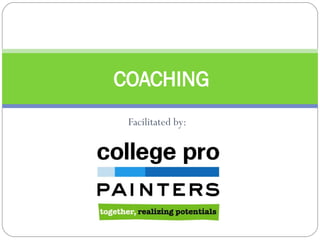
College Pro Painters - Coaching
- 2. Purpose To introduce coaching to the leaders of ACE. To help you develop your team’s programs and people through effective coaching/training. To give you the key fundamentals of effective coaching.
- 3. Where do you use Coaching?
- 4. Why is Coaching Important? To transfer skill To improve performance To foster healthy team sustainability
- 5. Coaching Themes Skill Specific Ask vs. Tell Less is More Appreciate vs. Depreciate Partnering – common performance goal
- 6. Effective Coaching Coaching Cycle
- 7. Effective Coaching - Prep PREPARATION Environment, Coach & Learner Decide on a goal Establish GAP There must be a different between the learner’s current level of skill and the target level The learner must understand/perceive this gap The learner’s GAP will drive the desire to learn
- 8. Effective Coaching - Do DO Coach demonstrates & observes Hits different learning styles Focused on the skill & outcome Outcome established during Prep stage Coach needs excellent skill/knowledge For appropriate feedback To role model
- 9. Effective Coaching - Feedback FEEDBACK RULES: Related to the goal/outcome Less is More Learner first – why? Ask vs. Tell What went well? What you change for next time? Listen & Validate Positive & Supportive 2 strokes for every poke
- 10. Effective Coaching – Follow Up FOLLOW UP Schedule it Build a plan for next steps Learner follows up with Coach Generally once skill has been used again next Do it!
- 11. Common Coaching Pitfall... DELEGATION TOO SOON! Leadership Styles vary with the competence of the learner. DELEGATION requires high competence
- 12. Coaching a New Skill DORAGI D – Demonstrate O – Observe R – Re-demonstrate A – Assign Task G – Goal Set I – Inspect
- 13. Summary The learner must have a learning GAP Prep – Do – Feedback – Follow Up Coaching is Skill Specific Don’t jump to Delegate
